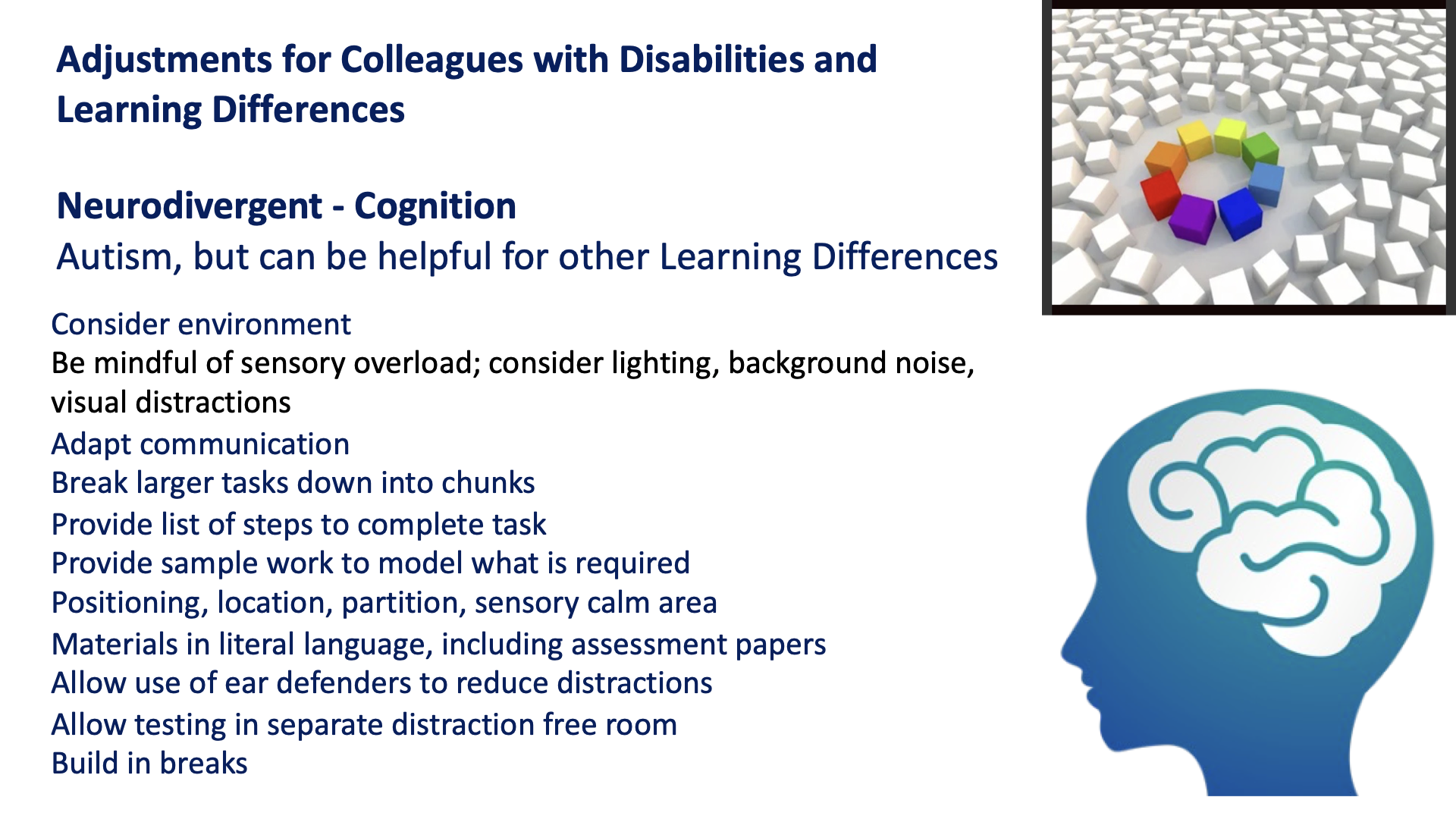Together for Mental Wellbeing
Supporting Every Ability:
Neurodiversity at Work
- All breakout activities for today can be found on this page.
- Please keep the tab open for ease.
- Scroll to each new activity when the time comes.
- Please make sure that all voices are heard and select a speaker, when required, to share a summary of what has been discussed.
Breakout Activity One:
Reflect and Discuss - Celebrating Good Practice
Neuro-Inclusion
Instructions
• Your leader for this activity will be the person who was born in the earliest month of the year
• Your leader will select a speaker for the team, who will share a brief summary of what was discussed. If you prefer not to speak, choose another colleague
• Your Leader will guide you through the questions below.
• Make sure that all voices are heard - consciously include all members of the team!
In relation to Neuro-Inclusion:
Team One (Room One)
- What do you and your team already do well but could do more consistently?
2. Is there anything you'd like to do better? What could you do to be more inclusive?
Consider: Colleagues, candidates and service users
Team Two (Room Two)
- What do we mean by accessibility and removing barriers?
2. Are we getting it right with regards to accessibility?
Consider: Colleagues, candidates and service users
Breakout Activity Two:
Receptive/Expressive Communication Activity
Instructions
- The person whose name is last alphabetically will be the leader of this activity.
2. Your leader will decide who will be Speaker A and who will be Speaker B.
3. Your leader will guide you through each part of the activity below:
PART ONE
In a moment, SPEAKER A is going to talk for one minute about their weekend and SPEAKER B is just going to listen.
OK – off you go [1 minute].
And stop!
How did that feel? Easy? Good!
PART TWO
Now, SPEAKER B is going to talk about their weekend for one minute. BUT they are not allowed to use any words containing the letter ‘e’.
Ready? Off you go! [1 minute].
And stop!
How did that feel?
Were you able to speak as fluently as your partner?
How did that make you feel?
SPEAKER A - how did it feel listening as your partner was struggling to put their thoughts into words? Frustrating? Annoying?
Discuss:
What was the purpose of this exercise?
How might it relate to your role?

Breakout Activity Three: Staff Case Studies
Instructions
Case Study One (Room One)
Case Study Two (Room Two)
Case Study Three (Room Three)
Case Study Four (Room Four)
Your
Leader
will be the person
born latest in the year.
The Leader will guide you through the activity, ensuring all voices are heard.
- Discuss assigned Case Study and
2. Consider the related Discussion Prompts
3. Suggest Practical Tips
4. Select a speaker to share with wider group
Some helpful links to assist with this activity:
ACAS information on Reasonable Adjustments
Case Studies
Case Study 1: Sarah – Administrator / Anxiety
Sarah is an organised and detail-focused administrator who ensures the smooth running of day-to-day operations. She is reliable, dependable, and excellent at keeping records up to date. Colleagues value her efficiency and willingness to support the team.
However, Sarah struggles with anxiety, particularly when unexpected changes occur or when she has to speak in front of groups. She sometimes avoids asking questions for fear of “getting it wrong,” which can lead to delays in clarifying important tasks. In high-pressure periods, she can become overwhelmed and withdraw.
Strengths:
• Highly organised and detail-oriented.
• Reliable and consistent in completing administrative tasks.
• Supportive team member, always willing to help colleagues.
Challenges:
• Experiences anxiety when faced with unexpected changes.
• Avoids speaking up in meetings, limiting her input.
• May become overwhelmed in high-pressure situations.
Reflective Questions:
• How can Sarah’s organisational skills be recognised and celebrated within the team?
• What adjustments could reduce her anxiety in meetings and during busy periods?
• How might supporting Sarah also create a calmer, more inclusive working environment?
Case Study 2: James – Support Worker / ADHD
James is a dedicated support worker who consistently brings innovative ideas to his role. He thrives under pressure and enjoys problem-solving, especially when navigating complex support needs with individuals accessing services. His energy and enthusiasm are contagious, often motivating both colleagues and the people he supports.
However, James sometimes struggles to maintain focus during long team meetings and can be distracted by side conversations or notifications. He occasionally underestimates how long tasks will take, which has led to missed deadlines for updating case notes. His manager has noticed that while James’s direct work with individuals is excellent, his written records and documentation can be incomplete.
Strengths:
• Creative thinker, excellent at developing practical solutions with individuals.
• Thrives in dynamic, high-pressure situations where flexible responses are needed.
• Brings energy and positivity, motivating colleagues and those he supports.
Challenges:
• Difficulty sustaining attention during lengthy meetings or training sessions.
• Time-management issues that impact timely completion of case notes and reports.
• Incomplete or inconsistent documentation of work.
Reflective Questions:
• How can James’s creativity and enthusiasm be harnessed to enhance the team’s recovery-focused practice?
• What adjustments could support James in staying on track with deadlines and record-keeping?
• How might supporting James in these areas also improve outcomes for the wider team and for people using services?
Case Study 3: Priya - Peer Support Worker / Autism
Priya has been a Peer Support Worker for two years. She is known for her attention to detail, reliability, and her ability to follow agreed care plans precisely. People she supports appreciate her calm and polite manner, and she is recognised for providing consistent, steady support that helps others feel safe and reassured.
Priya struggles when unexpected questions arise outside of planned conversations, and she can become visibly anxious during unstructured team discussions. She tends to avoid social gatherings and prefers to take lunch alone, which some colleagues misinterpret as unfriendly. Last-minute changes to her schedule or shift pattern can cause her significant stress.
Strengths:
• Careful, detail-focused approach to supporting people.
• Calm and consistent presence, valued by those she supports.
• Reliable and dependable team member.
Challenges:
• Finds unstructured discussions or unexpected situations stressful.
• May be misunderstood by colleagues due to her preference for solitude.
• Struggles with sudden changes to routine or shifts.
Reflective Questions:
• How can Priya’s reliability and calm presence be recognised and celebrated in the team?
• What adjustments could help Priya feel more comfortable during meetings and social interactions?
• How might supporting Priya also strengthen inclusivity and predictability for the wider team?
Case Study 4: Ahmed – Service Manager / Dyslexia
Ahmed is a highly skilled Service Manager who brings strong leadership and vision. He is excellent at developing new projects and motivating his team to embrace innovation. His verbal communication is engaging and he builds positive relationships with stakeholders and commissioners.
However, Ahmed finds written reports and formal documentation difficult due to his dyslexia. Preparing service evaluations and policy documents often takes him much longer than colleagues, and he sometimes avoids detailed written tasks. His emails can occasionally be unclear, leading to misunderstandings.
Strengths:
• Inspiring leader, excellent verbal communicator.
• Strong strategic thinker, good at “big picture” planning.
• Builds effective relationships with staff and external partners.
Challenges:
• Written communication can lack clarity.
• Administrative tasks take longer due to dyslexia.
• Avoids detailed report-writing when possible.
Reflective Questions:
• How can Ahmed’s verbal communication strengths be maximised in his role?
• What support could help him manage written documentation more effectively?
• How might adjustments also benefit other staff members with hidden needs?
Additional Case Studies for Extended Learning
- Charli is incredibly effective in their role as an Executive Secretary, having built trust and rapport with colleagues across the organisation, and has never believed their dyslexia to be an obstacle. However, recent changes in recording and reporting procedures have caused some anxiety. This has been brought to your attention and you must decide on the advice, support you will offer:
- 1.Charli
- 2.Charli’s Manager
2. Jo is a newly recruited Finance Officer, with so much energy and enthusiasm for their role, and is already achieving great results. Jo has lots to say but often doesn’t seem to listen to others, loses focus, and gets side-tracked.
When it comes to organising paperwork, Jo seems more reluctant. At a recent Internal Review, some important data had gone missing, and this has caused some concern for their Line Manager.
1.What advice can you offer Jo’s Line Manager
2.What practical support can be offered to Jo?
3. Ademola, is a highly efficient and thorough IT Assistant, who has been with the organisation for many years.
He is autistic and thrives when there are clear rules and routines but finds the unstructured parts of the day difficult. New changes to working conditions, in particular open office and hot-desk requirements have caused him to become visibly upset.
How can we support Ademola? What can be put in place?
Please scroll below these Case Studies to find further guidance and examples of Adjustments.





Additional Breakout Activity:
The Employee Lifecycle from an HR perspective
• Recruiting & Interview (Room 1)
• Performance Management (Room 2)
• Career Development (Room 3)
With a neuro-inclusive approach:
Discuss ways to enhance the experience of underrepresented candidates/colleagues and give an examples of what good looks like.
What would an inclusive leader do to demonstrate fair and equitable treatment of neurodivergent staff?
This might be something that you’ve experienced or something that you yourself do.
• Recruiting & Interview (Room 1)
• Performance Management (Room 2)
• Career Development (Room 3)
















